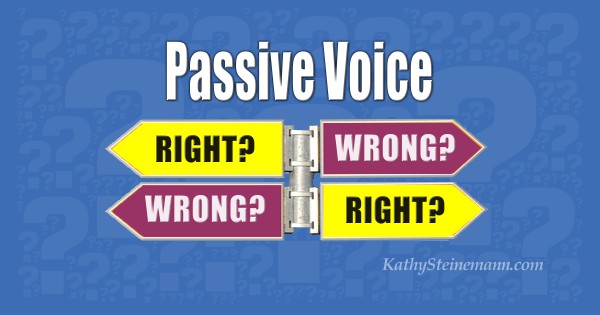
Writing pundits often regurgitate the rule about avoiding passive voice. They claim that passive is vague and clunky. Dan Brotzel shares his opinion.
Note: Dan follows British spelling and grammar conventions.
—
Why we need to stop worrying about the passive voice (and a more useful rule to follow instead)
Most of the advice given in writers’ manuals about the passive voice is inaccurate, and in fact all of the crimes we lay at the door of the passive can also be perpetrated by the active. Here’s what people are getting wrong — with a suggestion of a better writing tip to follow …
When sharing tips and rules on how to be a better writer, writing gurus and pundits will often reach for the one about avoiding the passive.
Using ‘active verbs’ will make your writing punchier and more direct, we are told. Passive voice is vague and clunky. Passive voice is a weaselly way of writing, which people use when they want to avoid taking responsibility for things. Avoiding the passive will make you a better writer.
And so on. I sometimes think part of the problem is the word passive itself — we seem to think there is an implied moral judgement here, as if using the passive voice somehow makes you a more passive person.
But none of the above passive-bashing really holds water. The passive is a subtle and very useful part of speech, as effective as any other when properly used.
Why listen to me?
Discussions of grammar often quickly get heated. While I have thought and written extensively about the passive over many years, I am not an academic linguist. Instead I rest my case on the experts at Language Log, the web’s leading linguistics blog, which has been discussing the issue in great depth for several years, and specifically on Fear and Loathing of the English Passive by Geoffrey Pullum, Language Log co-founder and co-author of The Cambridge Grammar of the English Language. Any errors that remain are of course my own.
Forming the passive:
Let’s start by looking at how the passive is formed and what role it serves.
English has two grammatical voices — active and passive. In an active construction, the grammatical subject of the verb is also the doer of the action, as in ‘The boy hit the dog’ or ‘A furious banging on the door woke him’. Here the subject (the boy, the banging) is also the agent, the doer of the sentence’s action (the hitting, the waking).
In the passive, the grammatical subject is no longer the doer of the action, but the recipient, or patient. It’s most commonly formed by a combination of the auxiliary verb ‘be’ + a past participle, e.g.: ‘The dog was hit by the boy’ or ‘He was woken by a furious banging on the door.’
As a technical term, the passive describes sentences or clauses, so there is really no such thing as a ‘passive verb’ (or an ‘active verb’) or ‘passive language’, and certainly not ‘passive tense’ — you can have passive sentences in any tense.
A couple more examples:
Active: Nadal beat Andy Murray in the final.
Passive: Andy Murray was beaten by Nadal in the final.
Active: She had loved him once.
Passive: He had been loved by her once.
Passive sentences place the emphasis on whoever is on the receiving end of an action. We focus on the sleeping man who has been jolted awake rather than the person doing the energetic door-knocking, for example.
Now this is actually very useful and natural sometimes. It makes more sense to say, ‘My mum’s been diagnosed with cancer’ than to say, ‘A specialist has diagnosed my mum with cancer’. In a sentence like that, it’s your mum you want to focus on.
The passive is also a great help when we simply don’t know who the doer is. We’re much more likely to say, ‘The President’s been shot’ than, ‘Someone has just shot the President’ or, ‘We’ve been conned!’ rather than, ‘Someone’s conned us!’
Bashing the passive:
It’s very easy to take random active sentences and ‘translate’ them into the passive, to ‘prove’ how clumsy and ‘passive’ the language becomes. ‘I want you’ becomes ‘You are wanted by me’, for example. But this is not how we use the passive in practice.
People also blame the passive as a way of shirking responsibility. In the passive you can often remove the agent or doer of the action altogether, as in ‘Your budget’s been cut’ or ‘Five posts have been rationalised’. Removing the words ‘by me’ allows me to get the unpleasant message across without implicating myself.
The Writer’s Lexicon series
and additional resources on my Facebook page.
In fact, you can do similar things in the active. These sentences are all similarly vague about agency:
The door opened.
The Sioux quickly disappeared from the plains.
The department will be shedding five positions.
He sustained severe injuries to the neck and shoulder.
This jug pours badly.
Getting the passive wrong:
Language Log has been collecting examples of people pontificating about the evils of the passive — while showing a complete misunderstanding of it — for years. And even those who appear to understand the passive will often make liberal use of this part of speech they profess to abhor.
In my first job, for a magazine empire, we were issued with a little in-house guide called The Writer’s Bible, which talked about the ‘passive tense’ and included several ‘passive’ examples that were actually active voice. Since then I have come across dozens of examples of my own.
For example, in a speech made to the European Commission, Plain English Campaign founder Chrissie Maher advised: ‘Be personal and stay active. Use “I”, “we” and “you”, and […] use the active, not the passive, voice of a verb. It is surprising how much of a difference those little changes make to the tone and sense of what you are writing. And just because the passive has been used in the original language, that doesn’t mean that you have to use the passive in English.’ Ironically, ‘has been used’ is a passive construction in English, and a perfectly respectable use.
I once attended a branding workshop (for my marketing day job) run for a big healthcare client by a top London agency. It included a whole section on the evils of the passive voice — illustrated with several examples that were actually in the active voice! I could go on.
The passive was condemned as far back as 1918 by Strunk and White in The Elements of Style — in a passage of text that’s full of passive constructions. (And before you leap to instinctive defense of that little book, read this first.) It was also derided in a famous essay by George Orwell — who, ironically, has been shown to be a writer with a higher-than-average passive count across his entire output!
Forget the passive — think about this rule instead.
It is of course true that clunky writing often comes with a good selection of passive sentences. Generally this is because the writer has focused on the wrong element of a sentence, and a passive construction — with its ability to switch the focus of a sentence — is the only way to repair the problem.
For example: ‘The wedding invitation was followed with surprising speed by an acceptance from my reclusive grandparents.’
In this sentence, the writer has chosen to focus on the actual paper invitation to the wedding, rather than the people being invited — or doing the inviting. A passive construction is the only way to save the day.
It’s certainly good advice to be specific about agency in your writing. My advice, in fact, is to stop worrying about the passive altogether and to take heed of the following tip from Joseph M. Williams, author of the excellent Style: Toward Clarity and Grace.
Williams suggests that we see every sentence we write as a story, with characters who carry out actions. To tell the most compelling story, the trick is to make sure that you identify the real characters — and turn them into your subject and object; and surface the key actions they’re carrying out — and make those your verbs.
To take the example above with the wedding invitation, the real characters of the story are the grandparents and the people issuing the invitation. The real actions are the inviting and the accepting.
So following Williams’ formula, and tweaking the wording a bit, we might end up with something more like: ‘My reclusive grandparents accepted the invitation almost at once.’
Now that we have a clear sense of who’s doing what, we could take this further. ‘My grandparents were notoriously reclusive, and I was terrified they wouldn’t come. So I was delighted when they accepted our invitation at once!’
As Williams puts it: ‘Readers are likely to feel they are reading clear, direct text when (a) the subjects of the sentences name the cast of characters, and (b) the verbs that go with those subjects name the crucial actions those characters are part of.’
Sound advice — and no mention of voice anywhere.
© Dan Brotzel
—

Dan Brotzel is co-author of Kitten on a Fatberg, a comic novel about a writers’ group.
His first collection of short stories, Hotel du Jack, was published in early 2020.

He was the winner of the 2018 Riptide Journal short story competition, and was highly commended in the Manchester Writing School competition 2018. He has words in places like Ellipsis, Reflex Fiction, Cabinet of Heed, Bending Genres, The Esthetic Apostle, Spelk, Pithead Chapel, Ginger Collect, and Fiction Pool.
He is also co-founder of leading UK content agency Sticky Content, and an expert and popular trainer in tone of voice, digital copywriting and content marketing. He remains a director of Sticky Content, which was acquired by the Press Association in 2013.
See also The Master List of So-called “Rules” for Writers.
Are You Interested in Word Lists and Writing Tips?
If you haven’t done so already, please subscribe to my blog. (The link will take you to the subscription widget at the top left of this post.)
I usually post two to five times monthly, and you can discontinue your subscription at any time.
The Writer’s Lexicon series
and additional resources on my Facebook page.

The best article I’ve ever read regarding the passive voice. Yours is an accessible explanation of both the passive voice and why it is not the evil proclaimed by so many writing authorities. I find the active voice frequently promoted as superior to the passive voice because its direct quality is preferred by modern audiences. That seems like a marketing strategy, not good creative writing advice. Anyway, thanks for providing a pathway out of the conflict.
Agreed, Russ, and sometimes passive voice is better:
“The bruised and beaten woman was treated by doctors, but they were unable to save her life.”
“On Angela’s birthday, she was surprised by a personal letter and gift from her favorite author, Sir Arthur Conan Doyle.”
“My boyfriend was killed. The gun was never found. But my innocence wasn’t doubted. Fools!”
And there are more examples on this page.
Thanks for stopping by, and stay safe!
Some very good points here, though I feel the need to quibble about the example near the end. Surely ‘The wedding invitation was followed …’ is passive (and there’s no active voice later on in the sentence), whereas Dan’s suggested ‘passive’ fix – ‘My reclusive grandparents accepted the invitation almost at once’ – is active? Maybe I’ve misunderstood something.
HI Graham
You’re absolutely right in your parsing. The point I was trying to make is that clunky writing does sometimes include passive sentences, but not so much because they are passive per se but because the writer is focusing on the wrong element of the sentence. The beauty of the Williams rule is that it helps fix such clunkiness without reference to the whole active/passive thing at all.
Dan
Hi Dan – OK, I see now. Thanks for the explanation.
I see that Dan has already replied to your comment.
Thanks for reading his post, Graham!
Yes!! Thanks for the wisdom, Dan!
Thanks for reading, Anne. Isn’t it refreshing to see another perspective?
Thanks very much for reading Anne!
Thank you so much for this post.
I admit to being shallow and petty but having been entangled and battered by advice; I thoroughly enjoyed learning that some of our writing heroes had transgressed the ‘rules.’
More importantly, now that you have validated my inklings regarding the importance of context in all areas, I shall be somewhat less anxious when I am admonished by an automated grammar checker on using the passive.
Thank you for your information and your clarity.
Thanks for reading Zara! Yes – don’t think we should worry too much about the passive, especially when many of those who want to ban it don’t really get it…
Yes, Zara, you’re right. Context is paramount. Thanks for reading Dan’s post.
Thanks very much for the opportunity to post this Kathy!
Thanks for your perspective, Dan!